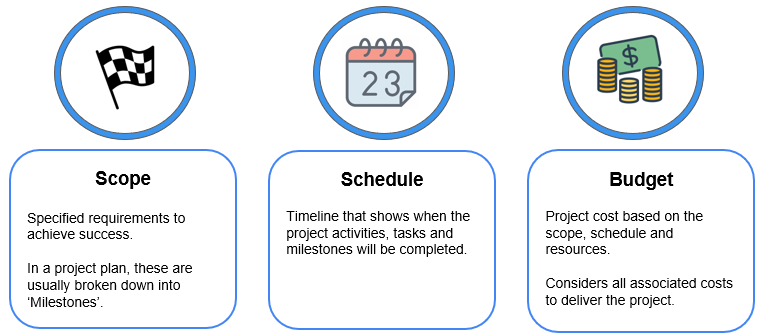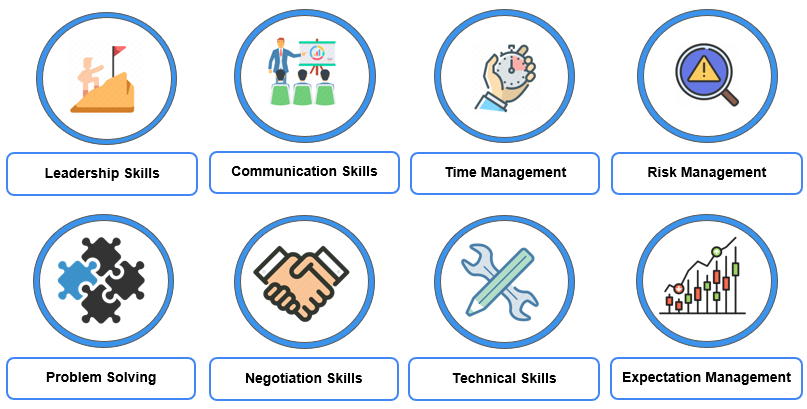These roles often work behind the scenes ensuring the success of key project initiatives and the removal of any roadblockers that might hinder the success of a project. Collectively they require a unique set of skills and qualities that can steer projects toward success or failure, with each project having its own unique set of challenges that one can learn from.
Scope, Schedule and Budget
As a whole, these three constraints are the main areas that a Project Manager (PM), Program Manager (PM) and Technical Program Manager (TPM) will focus on and depending on your role there is often more emphasis on one of these compared to the other. Often these are also referred to as the "Triple Constraint" or the "Iron Triangle" and more than likely when one of these elements changes, you will need to alter the other two elements to compensate. For example if a project's schedule shortens, you might have to increase resources thus impacting your budget, or alternatively you might explore the option of reducing the overall scope of the project to fit in this new timeframe.

Project Manager (PM)
PMs usually work on large singular projects, as a PM you will be involved in a project from Initiation through to the Handover stage controlling the scope, schedule and budget of that project, by overseeing the day-to-day running of the project, mitigating/resolving any issues that can affect the project delivery and lastly reporting on both a daily/weekly basis of the project status.
As a PM you are responsible for the overall success of a project and will be involved in numerous meetings with the teams that are responsible for delivering the requirements outlined in the project scope. This allows you to coordinate and loop in additional teams that might be required to assist in the project delivery and also keep track of any project risks or issues.
Program Manager (PgM)
PgMs take on a broader role, managing multiple interconnected projects that collectively support a strategic organizational objective. They are responsible for aligning these projects with the company's strategic vision, ensuring that resources are optimally distributed, and resolving interdependencies between projects.
As a PgM you are responsible for the overall delivery of multiple projects that are usually part of a Portfolio of works. Due to this visibility of multiple projects across an organization, PgMs also spend time on process improvement or creation in retrospectives or Lessons Learned sessions. From overseeing multiple projects and how teams within an organisation collaborate, PgMs get a good overview of this and as such can help improve these collaborative processes and how work flows between these teams.
Technical Program Manager (TPM)
Similar to the role of a PgM, TPMs oversee multiple interconnected projects that are usually part of a larger portfolio of works or a strategic organizational objective. However, as a TPM you will typically find that the projects you work on are more technically grounded and as such as a TPM you will typically be collaborating with more technical teams or departments.
As a result of this, a TPM must have not only a strong Project Management background but also a good technical understanding of the projects that you are delivering as this allows you to coordinate and loop in additional technical teams that might be required to assist in the project delivery.
Moving into Project/Program Management
There are many different paths one can take when trying to move into a career as a PM, however, I have found that from speaking with other PMs and from my own experience it is a mixture of Technical Understanding, Certification and Experience (key competencies).
Technical Understanding
Regardless of being a PM, PgM or TPM you need to have an understanding of the different technical phases in the sector you want to manage projects in. You can gain this from working in different roles within this industry and developing a well-rounded skillset in this sector. You don’t need to be an SME (subject matter expert) but it helps to have a good understanding of people’s roles and the part they play in delivering a project.
Certification
Most job requirements for a PM will require you to either have PMP, Prince2 or professional certification from an educational institute certifying you as a Project Manager. Having a strong understanding of the theory or principles of Project Management is key for any PM, as it gives you the tools and frameworks to run and learn from your projects. There are also a lot of introductory PM courses that you can do via sites like Coursera and Udemy that can give you a good understanding of what these certifications require, but these will not carry the same weight as what I have mentioned above. Additionally, if you are operating in the IT sector having additional certifications in Agile/SCRUM will also be of benefit as these are used on a daily basis to plan and deliver some of the smaller stages of a project.
Experience
Lastly, there is no substitute for experience, as a PM there are a lot of key competencies that you will be questioned about at the interview stage and will also need to call on when performing the role, as such there is no better way to learn and develop these skills other than time and learning from your professional experiences. Below is a list of key competencies that are generally brought up in an interview to get a better understanding of a person’s PM skillset.

Conclusion
Hopefully, this article has shed some light on these roles and also highlighted some of the similarities that they share within the Project space, PM/PgM/TPMs are the foundation of any successful project and delivering their key initiatives. Their leadership, communication skills, and ability to navigate complexities make them a foundation asset in the business world, allowing them to operate in a variety of different sectors. Whether it’s overseeing a single project, coordinating a program, or managing a technical team, these professionals play a vital role in shaping an organization's success. As businesses continue to evolve, the demand for skilled managers in these roles will only grow. If you find yourself more interested in moving into the World of Project Management please reach out.


